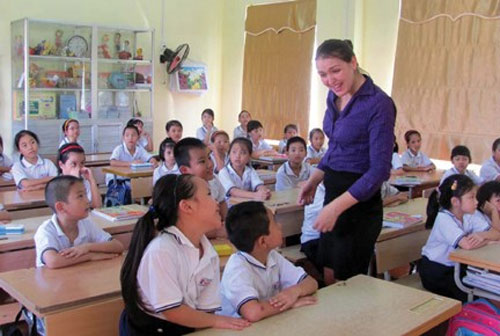VietNamNet Bridge – Vietnamese students with English names are not rare in English classes in Viet Nam, especially in those taught by native English speakers. But HCM City’s Education and Training Department does not approve: the department has banned the use of English names for Vietnamese students in its latest teaching guidelines for the school year, which officially took effect early this month.

According to the department, Vietnamese students should be addressed by the names they were given at birth by their parents as a way to show respect for the mother tongue and Vietnamese culture.
Supporters of the ban say that a name is one of first things that children recognise, one of first words they learn to say, and the way the world identifies them. A name also carries expectations, hope or personal meanings that parents and families want to give the new-born.
Vuong Bach Lien, of Ha Noi, said that she would like to be called Lien every where.
She said that she attended universities overseas and her professors always called her by her Vietnamese name instead of foreign names that are much easier for them to pronounce.
“Sometimes, they mispronounced my name but it doesn’t matter, at least it’s my name,” she said. “It’s me!”
Foreigners, particularly English teachers in Viet Nam, often say that pronouncing Vietnamese names with intonation and similar spellings is one of their difficulties when living and working in the country. It’s partly because of their different cultural background.
A Vietnamese tour guide who frequently introduces foreigners to the country said that the first thing he had to do when greeting foreign visitors was to introduce himself and his name—but it always took his guests much time and effort to pronounce and remember his name.
The pronunciation and the intonation, together with the different order of family name and given name, make it difficult for foreigners to understand how Vietnamese names work.
“That’s why I normally have my guests call me James Bond instead,” he said.
An experienced English teacher in Ha Noi told Viet Nam News that he agreed with the opinion that giving children outlandish names can encourage them to act out.
“When you name a kid Hulk, they take on the character of Hulk and they are harder to gain control of,” the teacher said.
“It’s also super fake and takes away from their character. I learned the names by calling their Vietnamese names for roll taking, and combined with learning Vietnamese.”
“In my classes, we always called kids by their Vietnamese names. I prefer this as it is more natural. I don’t take on a Vietnamese name,” he continued.
“But my current job I use English names that the kids choose for themselves. So I end up with lots of Elsa’s and Anna’s from Frozen, and Max from MadMax. They don’t realise MadMax is a crazy man,” he said.
Other English teachers also said that giving Vietnamese English names is kind of insult to their own language. It also proves that you are too lazy to study and pronounce a new language—not an attractive trait in a language teacher.
But many Vietnamese mothers who send their children to English classes with native teachers said that the ban was funny. They said that their children were happy with their English names.
“I don’t think Vietnamese names, English names could have negative impacts to my children’s study. Moreover, an English name could make them more familiar with the people, the language and the culture they are studying,” a mother said. “Don’t take it too seriously!”
When sending children to English class, what parents expect most is the teaching quality and environment, so that their kids could not only master the language but also know more about foreign people and cultures.
The writer agrees with the mother.
As a Government management agency, HCM City’s Department of Education should give attention to overseeing training institutions to ensure that they operate lawfully with standard teachers and proper facilities.
It’s not necessary for the department to intervene into teaching methods of teachers and training institutions.
Bich Huong
VNS